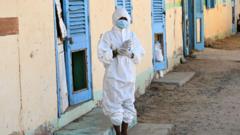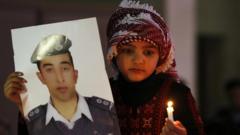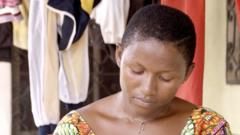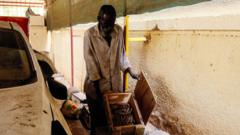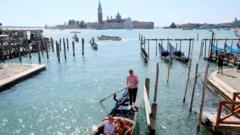Amid rising tensions and tragic fatalities, Jaramana's residents demonstrate the urgent need for effective security measures and the growing sentiment of self-reliance as sectarian hostilities threaten their safety.
# Jaramana's Residents Take Up Arms Amid Failing Security Measures

# Jaramana's Residents Take Up Arms Amid Failing Security Measures
In the wake of escalating violence, citizens of Jaramana are forming their own defense amid fears of government inaction.
In the aftermath of sectarian violence that resulted in the deaths of seven individuals, the city of Jaramana, home primarily to the Druse community, is witnessing its residents take security matters into their own hands. Armed civilians are now patrolling the streets, citing a lack of adequate governmental protection.
On Wednesday, the atmosphere was palpable with anxiety and vigilance. Gunmen of various backgrounds, donning casual and traditional attire alike, were seen at checkpoints throughout Jaramana, their rifles ready. The heightened state of alert was starkly reflected at a Druse religious hall, where grieving relatives gathered for the funerals of the seven men who fell victim to what local sources believe were Islamist militant attacks involving gunfire and shelling the previous day.
As anguished family members mourned, local fighters—including many of the deceased—worked to safeguard the area, confirming widespread discontent with the government's response. “We’re not seeing anything from the government,” lamented Ghassan Azzam, an attendee, emphasizing a growing sense of self-reliance in the face of insecurity.
While Syrian security force vehicles could be spotted intermittently patrolling Jaramana, residents have voiced their dissatisfaction with the government’s ability to protect them during this crisis. Many believe that their organized defenses are the only line of protection available amidst the escalating violence.
As Jaramana continues to grapple with external threats and internal worries, the city exemplifies a community responding to crisis with resilience, shaped by both urgency and the pressing need to ensure survival against mounting adversity.
On Wednesday, the atmosphere was palpable with anxiety and vigilance. Gunmen of various backgrounds, donning casual and traditional attire alike, were seen at checkpoints throughout Jaramana, their rifles ready. The heightened state of alert was starkly reflected at a Druse religious hall, where grieving relatives gathered for the funerals of the seven men who fell victim to what local sources believe were Islamist militant attacks involving gunfire and shelling the previous day.
As anguished family members mourned, local fighters—including many of the deceased—worked to safeguard the area, confirming widespread discontent with the government's response. “We’re not seeing anything from the government,” lamented Ghassan Azzam, an attendee, emphasizing a growing sense of self-reliance in the face of insecurity.
While Syrian security force vehicles could be spotted intermittently patrolling Jaramana, residents have voiced their dissatisfaction with the government’s ability to protect them during this crisis. Many believe that their organized defenses are the only line of protection available amidst the escalating violence.
As Jaramana continues to grapple with external threats and internal worries, the city exemplifies a community responding to crisis with resilience, shaped by both urgency and the pressing need to ensure survival against mounting adversity.







